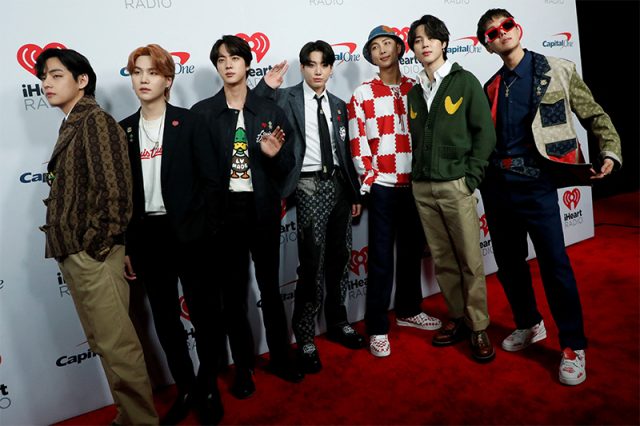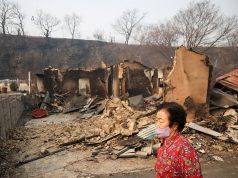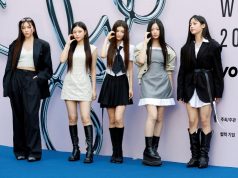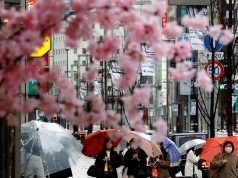
The decision by K-pop sensations, BTS, to take a hiatus is breaking hearts globally. But, unlike the Beatles or One Direction, their decision is tied to Korean peninsula politics and the challenge of balancing national security and Korea’s soft power ambitions.
RELATED: K-pop pioneers BTS’s time-out leaves fans tearful, investors irate
The seven members of BTS broke the news during their annual dinner, which was streamed live to fans worldwide on June 15, citing exhaustion and a desire to pursue solo projects. Some confusion arose afterwards when, in a bid to slow their tumbling stock price, the band’s entertainment company, Hybe, said BTS would continue to work both together and individually.
However, discerning fans suspect the decision is more calculated than suggested, speculating that some BTS members will soon be fulfilling their military service duties. The split comes just weeks after an intense political debate in South Korea over whether the group’s members should be exempt from South Korea’s compulsory military service requirement.
No exemptions
Typically, exemptions are only allowed for medical reasons, although the exemption system has been subject to abuse over the years. Major international competition winners may do forms of community service instead, such as that completed by Tottenham Hotspur’s Son Heung-min in 2022. This involved a few weeks of basic military training and volunteer football coaching for school children in London.
There had been some speculation that winning a Grammy in 2022 might secure BTS an exemption, but they left empty-handed – despite being one of the world’s top-selling acts.
The debate around military service has not been limited to K-pop stars. It has also been the subject of wider public discussion in recent years. These debates have mostly be driven by disaffected young men who feel increasingly frustrated at having to pause study and work to bolster South Korea’s defences, primarily against North Korea.
Military culture
Military service was introduced at the founding of the South Korean state in 1948. It proved necessary after the Korean War (1950-53) to ensure South Korea could defend itself against another attack from North Korea.
The military then remained front and centre of Korean nation-building throughout the country’s rapid industrialisation under a succession of military dictatorships, from the 1960s until democratisation in the late 1980s.
Even though Korea has had a series of non-military, civilian presidents since 1993, serving in the military continues to be a central part of men’s qualifications for work and life, binding them to the nation-state’s persisting culture of militarism. For example, completing national service is still considered proof a man is a committed South Korean citizen. It is a prerequisite for many civil service and corporate jobs, and military alumni networks continue to influence a man’s opportunities throughout his life.
While young men no longer need to serve the three years’ conscription demanded of their fathers and grandfathers, the current 18 months required before they turn 28 is regularly cited as a top complaint among South Korea’s youth in recent years.
In 2015, young people began describing life in South Korea’s hyper-competitive society as “Hell Joseon”. This is, they argue, a reincarnation of the feudal and hierarchical Joseon Dynasty society (1392-1897), which was marred by extreme social and economic inequality. Military service is seen as one of a long list of demands on an already overburdened male demographic fighting for access to a reputable education, a secure job and a good marriage in system that is stacked against them.
Competing national interests
In this contentious environment, allowing seven seemingly healthy, young, male citizens to skip military service might not be a good decision for South Korea’s newly elected president, Yoon Suk-Yeol. Yoon has been keen to win over young male voters, the leading voices of discontent in the “Hell Joseon” debate. But Yoon also knows the need to maintain a credible defence capacity against the threat posed by North Korea.
The South Korean government faces another pressure though: the need to continue promoting and exploiting the success of its popular culture industries.
The “Korean Wave”, which refers to the global popularity of Korean music, film, television and other aspects of popular culture, is a major source of export income that also generates considerable soft power gains for Korea. BTS has been at the top of the wave for years, alongside Korea’s global success in film (Parasite, 2020) and television dramas (Squid Game, 2021). BTS was the first Korean pop group to “break America” and the world, thanks to English lyrics, catchy tunes, digital fan networking and high-profile international collaborations.
Beyond the music, BTS’s influence over legions of Korean and international fans won them a place on the podium at the opening of the 76th session of the UN General Assembly alongside then president Moon Jae-In in 2021. More recently, they appeared at a White House summit on anti-Asian hate. They are Unicef Ambassadors and have travelled the world spreading their message of love. With their success has come considerable gains for South Korea’s international standing.
So there is a tension between South Korea’s soft power imperatives and its need to maintain conscription. K-pop groups since the 1990s have given up lucrative success to serve their country’s national security needs. Members of the K-pop groups SHINee, VIXX and 2AM have all announced a hiatus to complete their military service.
BTS’s global fame, however, may make them an exception. It might be possible that the members fulfil their national service duty and return to the K-Wave fold, either individually, in twos or threes, or all together. Judging by the outpouring of love for them online at present, they would be welcome on any stage, anywhere, if the opportunity to reunite emerges.![]()
Sarah A. Son, Lecturer in Korean Studies, University of Sheffield. This article is republished from The Conversation under a Creative Commons license. Read the original article.
RELATED: Korean pop band BTS taking hiatus to work on solo projects









